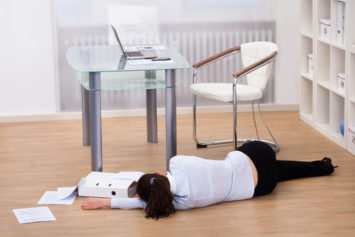Yesterday in our series on holiday hazards, we talked about the ways workers can hurt themselves when they’re trying to get at something that’s out of reach. But falls from elevations are not the only hazard workers face during the holidays; they may also be at increased risk from falls on the same level.

Today, we’ll look at the hazards specific to winter and the holidays that can create same-level fall hazards for workers.
Slick Surfaces
Slick surfaces may be more common both indoors and outdoors in winter. The combination of cold temperatures and precipitation leads to snowy, icy sidewalks and parking lots, and tracked-in moisture may leave indoor areas wet and slick. Combat slippery surfaces by:
- Providing additional mats when needed
- Promptly removing ice and snow from parking lots, garages, and sidewalks
- Placing freezing weather warning monitors at entrances to employee parking areas
- Displaying contact numbers for the maintenance department so employees can report slick conditions
- Placing bins of ice-melting chemicals in outdoor areas of heavy pedestrian traffic
Hidden Obstacles
Snow can obscure curbs, drains, and other tripping hazards outdoors. Darkness comes earlier and lasts longer in winter, also making obstacles more difficult to see. Make it easier for workers and patrons to come and go safely by:
- Implementing an effective program for clearing walkways of snow and ice, and
- Maintaining adequate outdoor lighting in pedestrian areas.
Obscured Vision
In addition to the hazards weather creates, workers may create their own same-level fall hazards by overburdening themselves. Carrying large bundles or objects can obscure a worker’s vision whether they’re carrying piles of wrapped gifts or totes of holiday decorations. Minimize this hazard by:
- Reminding workers to make multiple trips, rather than carrying so much that they can’t see where they’re going, and
- Providing dollies, carts, or other material-handling aids for workers who are moving lots of items out of (or back into) storage, or from one area to another.

